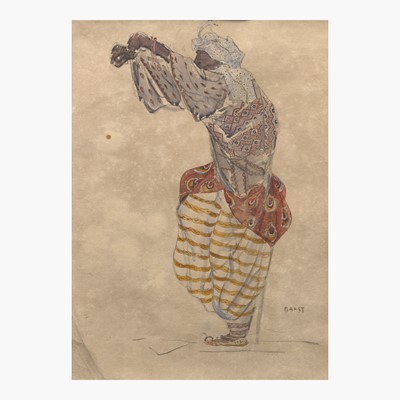February 22, 2022 12:00 EST
European Art and Old Masters
46
Leon Bakst (Russian, 1866–1924)
Costume Design for 'Istar'
Pencil signed 'BAKST' bottom right, watercolor and gouache heightened with gold and silver paint on paper
Sheet size: 16 1/16 x 11 5/8 in. (40.8 x 29.5cm)
Executed in 1924.
Provenance
The Artist.
Collection of Gabriel Astruc, Paris.
By descent in the family.
Acquired directly from the Astruc descendents.
Private Collection, France.
Sold for $17,640
Estimated at $10,000 - $15,000
Pencil signed 'BAKST' bottom right, watercolor and gouache heightened with gold and silver paint on paper
Sheet size: 16 1/16 x 11 5/8 in. (40.8 x 29.5cm)
Executed in 1924.
Provenance
The Artist.
Collection of Gabriel Astruc, Paris.
By descent in the family.
Acquired directly from the Astruc descendents.
Private Collection, France.
Note
The present work will be accompanied by a copy of an original letter sent by Bakst to Gabriel Astruc, dated May 28, 1924.
Istar was the last of Leon Bakst's productions, who never attended the final performance. Conceived as a dancing poem of twenty minutes in one act by its composer, Vincent d'Indy, it was performed just once on July 10, 1924 at the Théâtre National de l'Opéra in Paris, in honor of the International Olympic Committee. The production starred Ida Rubinstein, a strikingly beautiful, wealthy and temperamental ballerina and actress who was also Bakst's longtime friend. It is said that Bakst's sudden and fatal illness was in fact due to the tumultuous collaboration with Ida Rubinstein over the ballet, which demanded much physical preparation work in itself, but also stimulated the lead's ego and expectations. On that note, Prince Lieben, a close friend of Bakst, recollected an exceptional fit at one of the rehearsals, during which "Bakst began shouting wild abuse to all and sundry." Bakst himself confesses in the the copy of the letter accompanying the present work: "it is the most difficult stage production of my whole artistic life". The letter speaks to Bakst's agitated state of mind in his final days, as he lists the numerous steps he has to complete before the final day, and already envisions the corrections he will have to provide. Bakst eventually died on December 27, 1924 at Rueil-Malmaison, just outside of Paris of what was medically described a failure of the kidneys, and pneumonia.


